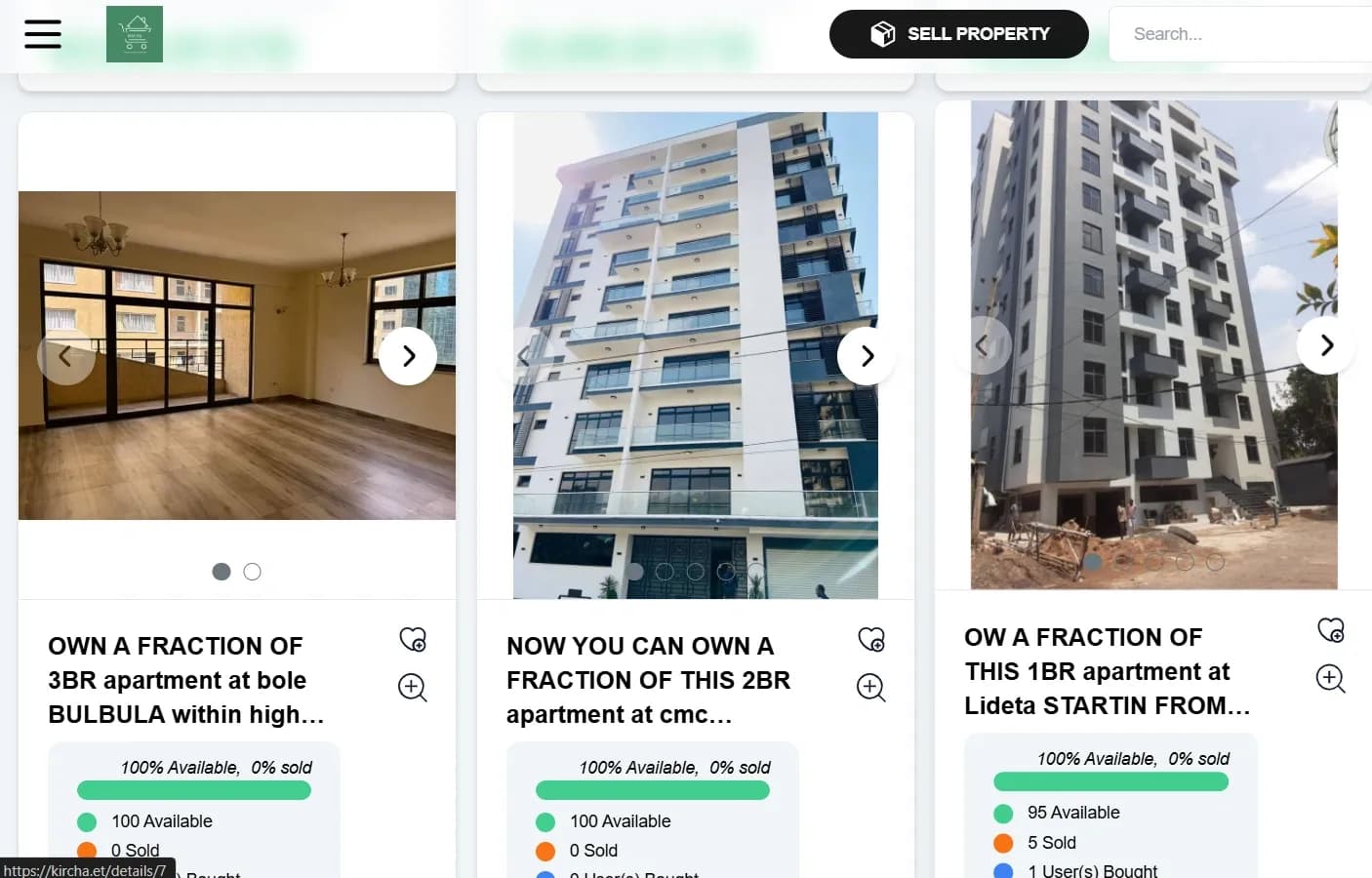Progress for 0 ad
Progress for 1 ad
Progress for 2 ad
Progress for 3 ad


Munir Shemsu
Addis Ababa, Ethiopia

An innovative undertaking by three entrepreneurs looks to introduce fractionalized ownership of real estate into Ethiopia’s credit-squeezed property market. Kircha is pioneering a product that allows crowdfunding and collective investment scheme formats in its bid to” democratize real estate.”
The Company has already received a patent from Ethiopia’s Intellectual Property Authority for its ambitious product. Kircha takes its name from a local holiday tradition whereby relatives or neighbors pitch in to buy cattle to share meat portions based on their contributions.
Nebil Semeru, Co-founder and CEO, says the current real estate market in Ethiopia excludes a significant portion of middle- and low-income individuals. The entrepreneur behind the reusable Babylo diapers got together with fellow businessman Matios Neba who owns the cosmetics company Etcare and engineer Tesfamichael Tigabu to untangle Ethiopia’s real estate sector.
“Most Ethiopians can’t afford the down payments let along the full price for a home these days,” he told Shega.
Following nearly two years of development, Kircha applied for the sandbox unveiled by the Ethiopian Capital Market Authority (ECMA) back in August. The Sandbox allows innovative companies to test out products in a flexible legal framework while entailing a potential green light to operate in the country’s nascent capital market.
Six months down the line Kircha, has undergone two reviews through the Program which could usher in improved testing capabilities, support or a final nod.
While Kircha has yet to receive an ECMA license, the founders express feeling a sense of support and guidance from the Authority.
If all things pan out as planned, Kircha hopes to avail fractional ownership of property for as little as 50,000 birr and up to a maximum of 30% of a property’s value.
“We are looking to remove the financial barriers to entry,” Nebil says.
Homeownership in Ethiopia is out of reach for most due to cross-cutting supply and demand issues. The 2023 report by the Center for Affordable Housing Finance in Africa estimates 160 000 formal housing units are produced annually nationwide. This falls short of the almost half a million needed to address the growing backlog.
While fractionalized ownership of property is new to Ethiopia, several companies have explored the emerging industry worldwide over the past decade. The Jobs Act signed into law by President Barack Obama in 2012 relaxed rules allowing emerging growth companies to raise funds. A crowdfunding exemption through funding portals for offerings up to $1 million also enabled innovative businesses to access capital in markets historically dominated by larger firms.
San Francisco-based companies like Pacasso have made headway with ownership of vacation homes for the wealthy while Chilean firms like Fraccional are exploring investments for as small as $300. The latter has recently announced plans to expand into the US with Miami, Florida being eyed as its first market. Tokenization, smart-contracts and AI are also becoming powerful forces in simplifying management and ownership of fractionalized assets.
Kircha’s founders expect to explore all emerging technologies in due time and place as the Platform gets a solid footing.
“We don’t want to drop it all at once,” says the co-founder
A detailed and independently audited financial report including Internal Rate of Returns (IRR), CAP rates and Net Present Values will constantly be available for users of the Platform. Only rigorously vetted properties will be listed says the Co-founder expounding on their desire to cultivate informed investors.
Kircha will charge fees for Asset Under Management, Acquisition and Disposition once it gets fully rolling.
Ethiopia’s real-estate market has experienced a sweeping liquidity squeeze over the past two years as the Central bank began implementing tight monetary policies. Developers have struggled to access finance as banks operate under a credit cap partly pulling property prices and demand down.
“It is a buyers’ market now,” Nebil notes.
👏
😂
❤️
😲
😠

Munir Shemsu
Munir S. Mohammed is a journalist, writer, and researcher based in Ethiopia. He has a background in Economics and his interest's span technology, education, finance, and capital markets. Munir is currently the Editor-in-Chief at Shega Media and a contributor to the Shega Insights team.
Your Email Address Will Not Be Published. Required Fields Are Marked *